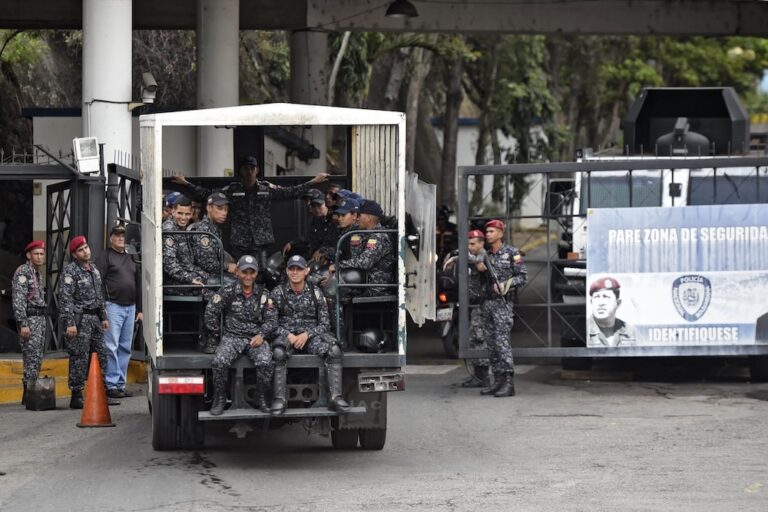The District Attorney's office summoned Diario 2001 newspaper directors after the president asked for "the most stringent punishment" for an article about irregularities in the supply of gasoline.
On October 17, 2013, the District Attorney of the Republic (in Spanish, FGR) summoned Luz Mely Reyes, director of Diario 2001, Omar Luis, assistant director and Juan Ernesto Paez-Pumar, head of information of that same newspaper to appear as witnesses. The subpoenas resulted from an investigation advanced by the state against Diario 2001 – a newspaper owned by private corporation Bloque de Armas, based in Caracas – after it published a headline referring to reports of irregularities in the supply of gasoline, published on October 10.
At the time when IPYS Venezuela published this alert on October 17, the witness questioning was being carried out at the District Attorney’s office.
Expedited Summons
Through its website, the public prosecutor’s office stated that the information in the article by Diario 2001 entitled “Gasoline sold drop by drop” is false and is part of an alleged “destabilizing plan”.
Close to 11:30 a.m. the journalists, who direct the newspaper, received the subpoena at the paper’s headquarters, indicating they had to appear at the District Attorney’s office at 2:30 p.m. Luisa Ortega Díaz, the attorney general of the republic, had announced this procedure on her radio program “En Sintonía”, aired on the state radio channel Radio Nacional de Venezuela.
Although Reyes, Luis and Paez-Pumar were summoned as witnesses as part of the legal inquiry advanced by the public prosecutor’s office, the inquiry has been deemed a threat against freedom of expression since the state cannot take criminal actions against the exercise of journalism. This case is taking place within a history of recurrent actions criminalizing the work of the private and independent press by Venezuelan state authorities, which are systematically being based on the application of criminal sanctions aimed at threatening and exerting pressure on those whose work it is to inform the general public.
The Facts
On October 10, 2013, the attorney general of the republic said she had commenced inquires against the paper for generating “gloom and doom”. Meanwhile, Nicolás Maduro, the president of the republic, asked for “the most stringent punishment”.
Ortega Díaz said that Diario 2001 had published “information which seeks to create chaos, unrest, gloom and doom”, with the publication of an article that same day indicating some delays in the supply of fuel at gas stations. She added, “We are going to have to act very severely”.
The article in Diario 2001 was based on citizen reports on the lack of 91 octane gasoline. The article indicated that “gas stations receive less than half the fuel they used to receive three years ago”.
With that day’s edition in his hands and after calling the headline “rude and vile”, Nicolás Maduro pointed out that this “is a crime”. “Society must be defended against these bandits, these delinquents”.
“The owner of this newspaper who is responsible for these headlines must go to jail. All as per the law. This is a crime and we cannot accept it”, he stated.
Maduro justified this, stating that Diario 2001 “is aiming at sabotaging the (nation’s) gas and hydrocarbon distribution system”.
“Nobody is going to accuse me in Venezuela or in the world of curtailing freedom of expression. This is a free country (…) but freedom of expression is one thing and debauchery is another”, the head of state added.
Meanwhile, in an opinion piece published on October 14 in the Últimas Noticias newspaper, Ortega Díaz stated that “the destabilizing entities have wanted to insert a new opinion on an alleged scarcity of gasoline, aiming at creating restlessness in the population, but we have been able to verify that this is false (information)”.
With these official statements, the principle of presumed innocent has been breached, as per article 49 of the nation’s constitution, since the legal authority has offered an opinion in advance of the trial.
Disproportionate measure
In a conversation with IPYS-Venezuela, Luz Mely Reyes said that the president’s reaction against the newspaper is “disproportionate”. She questioned the public authorities reacting this way instead of appealing to existing resources in the Venezuelan legislation to solve differences with respect to journalistic information. One of these mechanisms is the right to rebuttal and rectification, as per article 58 of the national constitution.
Fines on expression
Accusations criminalizing freedom of expression and information run counter to constitutional principles and international standards on freedom of expression.
This incident takes place at a crossroads where the Instituto Prensa y Sociedad de Venezuela (IPYS-Venezuela) has recorded a disproportionate use of the state’s power, through legal mechanisms, to criminalize the work of journalists and private and independent media, in various parts of the nation.
In the report “Legal proceedings threaten expression in Venezuela“, published by IPYS-Venezuela in August 2013, we stated that “some reports filed by various executive representatives have been backed by actions by the District Attorney of the Republic, showing a possible articulation among the public powers to restrict the exercise of freedom of expression and information by media employees as well as society at large”.
For this analysis, Héctor Faúndez Ledesma, attorney and specialist in freedom of expression, stated that in Venezuela the public powers have “resorted to penalizing expression and the right to information”, a situation which runs counter to international standards for the exercise of these rights. “Punitive measures are applied for exercising a fundamental right and freedom, which is freedom of expression”, he underscored.


